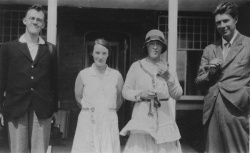Lionel Robbins
 Arnold Plant, ?, Janet Beveridge, Lionel Robbins. 1920s. | |
| Born |
November 22, 1898 Sipson, Middlesex, England, United Kingdom |
|---|---|
| Died |
May 15, 1984 (aged 85) London, United Kingdom |
A London School of Economics gradudate of the mid-twenties, Robbins had been appointed to a chair in 1929 at the young age of thirty. Hugh Dalton had sponsored him, partly with the conscious intent of throwing a cat among the pigeons. He had led a revival of the economics unit, and been instrumental in the hiring of Friedrich von Hayek. It was originally at his invitation that the Austrian economist, then thirty-two, came to give a set of lectures on monetary theory. Hayek was then asked to stay, and shortly afterwards given a permanent chair. He and Robbins immediately charged into two battles, one public, the other private, that would be highly consequential for the future of political economics. One they lost, but in the other they tasted victory.
The first struggle was a highly public contest between Hayek and John Maynard Keynes. Robbins may well have been planning it when he urged Hayek's appointment in the first place, as he and Keynes had just clashed violently in their role as government advisers. Keynes himself was now finishing the grand synthesis of interventionist economics that would become The General Theory of Employment, Interest and Money. Their conflict climaxed publicly in 1937 with Hayek's apparent defeat. At the same time, however, the group also conducted a second, private but harsher campaign within the precincts of the LSE itself. Their target here was William Beveridge and all that he stood for. Robbins, Hayek, and Arnold Plant collaborated on a seminar about the problems of "collectivism," while Robbins himself ran a longer-term seminar addressing economic issues like monopolies. A roster of participants including Plant, Hayek, and (among students) Ronald Coase dissected collectivist policies for weeks on end. And the three took full advantage of the LSE's house journal, Economica, to publish the resulting arguments and analyses. Under Robbins's direction, Economica became the public home of an emerging anti-Keynesian party. As they assailed Keynes, therefore, at the same time they engaged in an internal war with Beveridge over the fate of economics at the School. This feud, which also culminated in 1937, they won. The director departed for Oxford amid celebrations by the triumvirate. They had made the LSE a bastion of "liberal" convictions to stand against Keynes's Cambridge.[1]
Notes
- ↑ Johns, Adrian (2010). Death of a Pirate: British Radio and the Making of the Information Age. W. W. Norton & Company, pp 74-75.